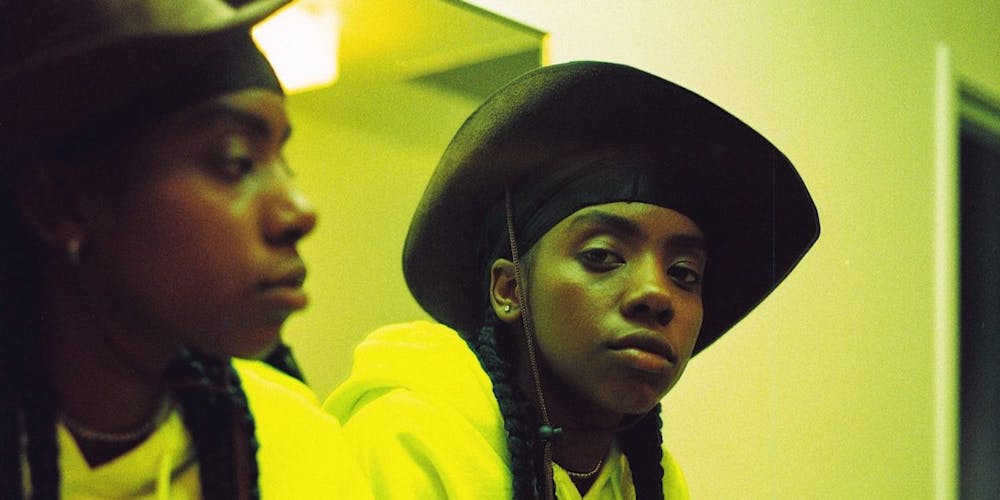Last month, Duke Performances’ Building Bridges: Muslims in America initiative hosted its first artist since March 2021 and its first in-person artist since February 2020. Dua Saleh — a Sudanese-born, Minneapolis-based musician and actor — had a hybrid residency: an Oct. 12 Zoom conversation between Saleh, Duke alumna Treniyyah Anderson (‘20), and Maryam Arain from the Center for Muslim Life and an in-person concert Oct. 13 at The Pinhook in Downtown Durham.
During the Zoom conversation, they discussed their childhood in Sudan and their burgeoning musicianship.
“Sudan is a creative hub for a lot of people in the Afro-Diaspora and in East Africa… We’re known for our poetry across the African Diaspora and Arab-speaking places,” said Saleh.
Tied to this origin story and before beginning their career as a musician, Saleh performed spoken-word poetry.
“I transitioned [from poetry] into music pretty easily just ‘cause it was something that was internally necessary, or very grounding for me.”
In 2019, Saleh’s first EP, “Nūr,” was released. “Nūr” means “the light” in Arabic. Their second EP, “Rosetta,” dropped in 2020. The EP was named after American singer-songwriter Sister Rosetta Thorpe. Their newest EP, “CROSSOVER”, was released last Friday. “CROSSOVER” and all Saleh’s other music is available on Spotify.
Saleh cites their Muslim upbringing as a strong influence on their music.
“I think I was kind of blessed to be around… musicianship all the time, people playing different instruments and people writing poetry, and also being raised in a Muslim household,” Saleh stated. “The Quran is one of the most beautiful texts… that I’ve ever encountered… The Quaranic recitations are really stunning and beautiful. That contributed to how I can sing and what I’m able to do with my voice.”
I had the pleasure of attending their performance at The Pinhook. At the beginning of the night, Saleh asked the audience to participate in a call-and-response-style song that they wrote that reminded them of their childhood in Sudan. The rest of the night was a mixture of Saleh’s older music and a preview of some songs from“CROSSOVER.” Saleh took several breaks between songs to talk to the audience about their process. The performance had an atmosphere of intimacy and exchange that Building Bridges aims to cultivate with all of its residencies.
The project launched in 2018 following a 2017 grant from the Doris Duke Foundation for Islamic Art. Brian Valentyn, Manager of Campus and Community Initiatives within Duke Performances, has been instrumental in running Building Bridges since its inception.
“[Building Bridges] is positioned very much as a counterpoint to the Islamophobia that became mainstream in the wake of 9/11, and which had been percolating for many decades before that. It seeks to combat the idea that Islam, and Muslims, somehow compose a monolithic entity, rather than a global community that is racially, geographically, and ideologically diverse,” Valentyn wrote.
The project is as dedicated to educating the Duke student body as it is to spotlighting Muslim artists.
“At Duke, we’ve visited large 250-student lecture classes like Mark Anthony Neal & 9th Wonder’s “History of Hip-Hop” — always a treat — as well as smaller classes across a range of disciplines, from religion to Public Policy. I’ve found Duke students incredibly receptive and eager to learn more about these artists and how their exposure to Islam and different Muslim cultural traditions inform their work.”
In addition, Building Bridges aims to positively impact the Durham community, specifically through artists’ engagement in Durham Public Schools. A notable example of that engagement was during Building Bridges’ first residency: Alsarah & the Nubatones.
“I’ll never forget bringing Alsarah to Durham School of the Arts and having the 90-student Chorus greet her with a new arrangement of one of her songs, “3roos Elneel (Bride of the Nile),” which we worked with former Duke composition student Sid Richardson to produce,” recalls Valentyn. “Alsarah posted about the experience on Facebook and had followers in Sudan express gratitude and amazement that American teens appreciated Sudanese music. It was an incredibly special moment — offering proof of art’s ability to collapse the boundaries between the local, national, and international, and to forge new empathic connections between individuals and cultures. That, in short, is what the series has sought to achieve.”
Building Bridges is funded through the end of 2022. Although previous artists have primarily been musicians, a goal of the initiative’s “second phase” is to include other types of artists. Phase 1 of Building Bridges concluded at the end of February 2020, and Phase 2 began with renewed funding in September 2020. However, the next residency was not until March 2021, when Building Bridges hosted Amir Sulaiman, who engaged with the Duke and Durham community through his poetry and short film called “Laying Flowers Setting Fires.”
Valentyn is particularly excited about a future project in collaboration with Mipsterz, an arts and culture collective that is also funded by the Doris Duke Foundation. Building Bridges will partner with Mipsterz to bring the organization’s exhibition, ALHAMDU, to the Duke community next September. ALHAMDU aims to project the vision of “Muslim Futurism” through art and public engagement that are centered around five key themes: imagination, identity, community, resistance, and liberation.
Get The Chronicle straight to your inbox
Sign up for our weekly newsletter. Cancel at any time.

